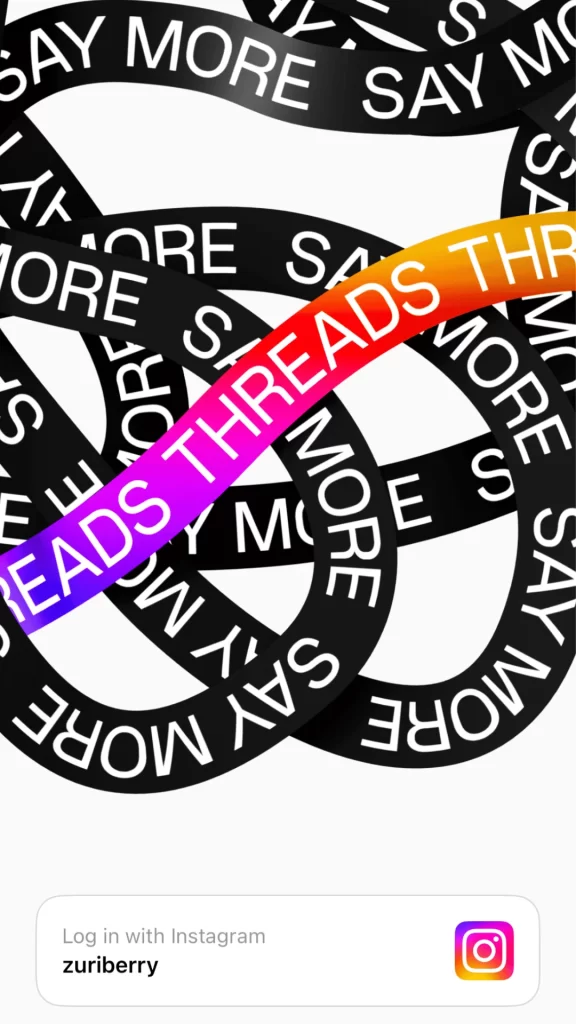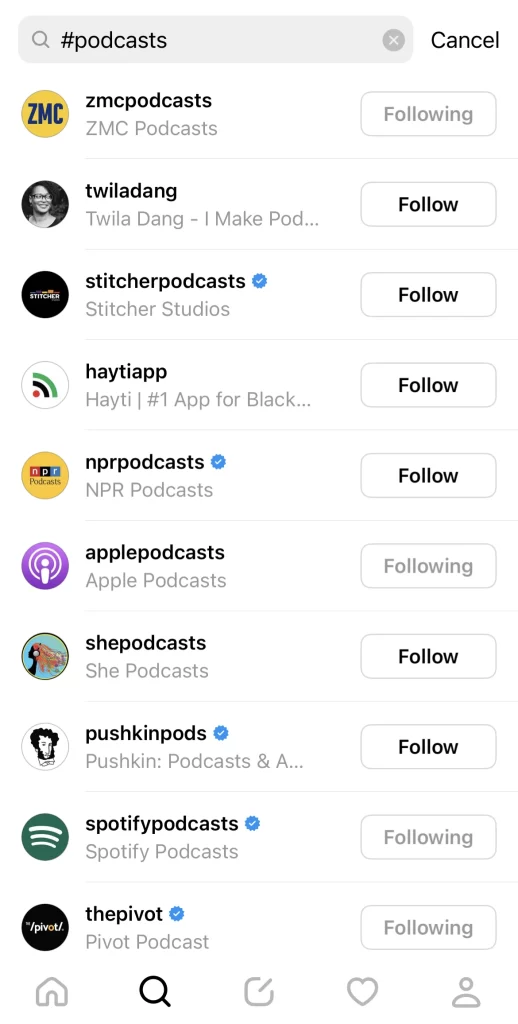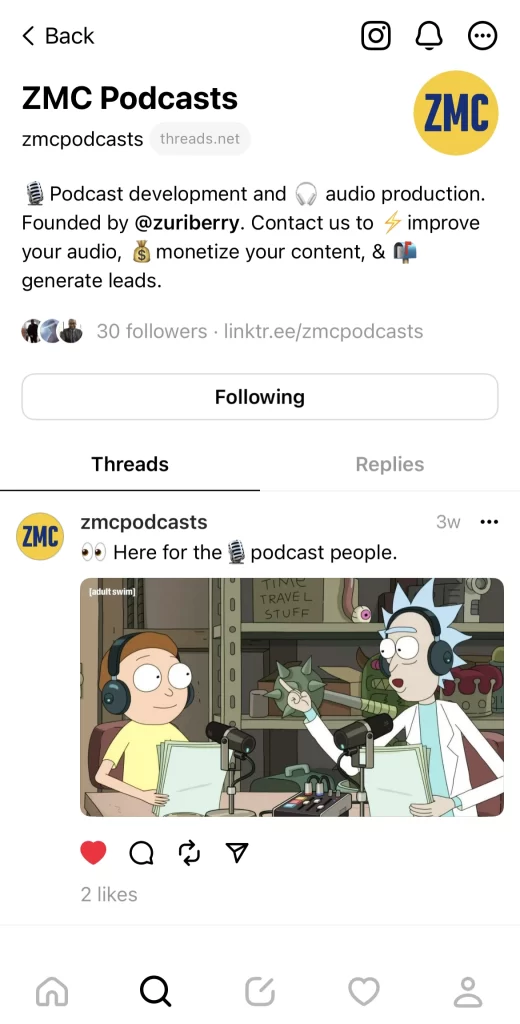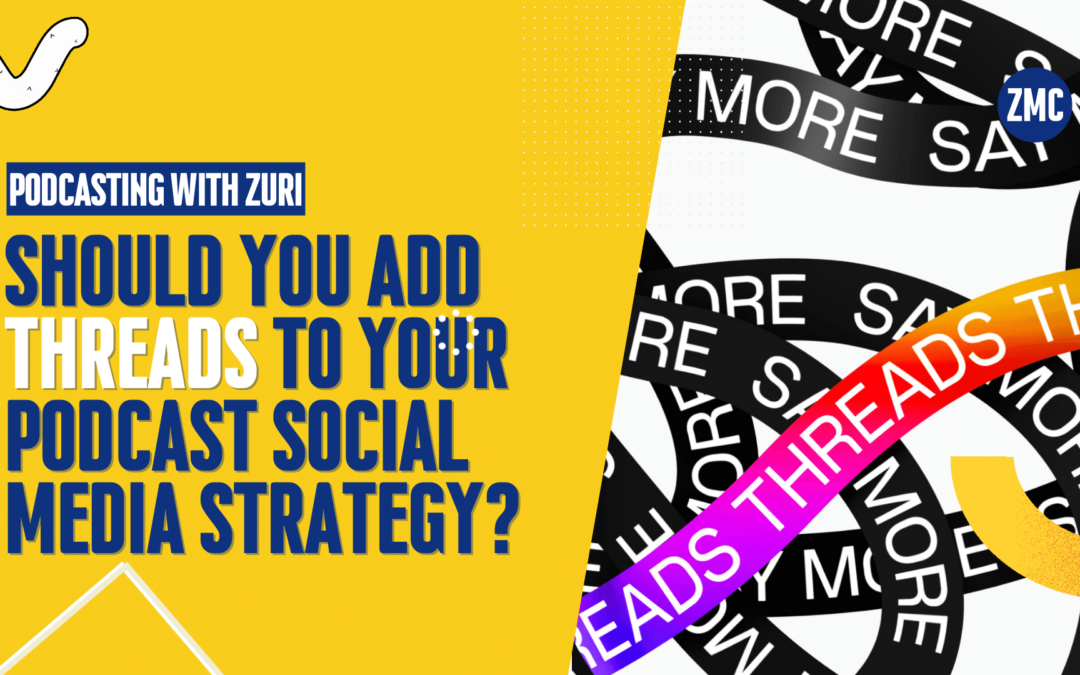Podcasts have a well-known discovery problem. It’s a problem that many companies and podcast platforms are working hard to solve.
So when a fancy new social media network comes along, like Threads did last month, and successfully entices more than 100 million users to give it a try, you have to be willing to shake the tree and see if there’s something viable about it that could help you share or grow your podcast.
That’s what I’ve been thinking about and testing for the last month. Is Threads a worthy addition to your podcast’s social media strategy? Or is it too soon?
Let’s dive in.
The backstory on Threads and why it matters for your podcast social media strategy
Threads is Meta’s alleged Twitter killer.
Twitter, which recently rebranded to X, has been heavily criticized by its users and advertising partners for rapid changes to the social network, including modifications to its content moderation policies, its introduction of paid subscriptions, and a deterioration in the site’s stability.
But at its core, X is a text-based app. When it launched in 2006, it was frequently referred to as a micro-blogging site.
Over the years, it expanded to incorporate photos, videos, live streams, newsletters, and even audio in the form of voice notes. One of its most significant features is Spaces, a relatively new and popular attraction for live conversations. Its launch was a welcome addition for podcasters seeking to boost their engagement on the platform.
As Twitter has grown, its hold on cultural conversations has ballooned, giving users access to real-time information and commentary. But most importantly, it built sophisticated tools to cater to marketers, including the ability to measure, track, and target its users based on their interests.
X’s marketing and advertising tools were never as robust as Facebook’s, but with more than 300 million users and a vice grip on the internet’s water cooler, it has always been a worthwhile channel to set up shop, especially if your campaign’s focus was on brand awareness.
Unfortunately, Twitter was never great for podcasters. There is too much friction between the incentives of Twitter and content creators. For example, Twitter has actively encouraged users to create content specifically for its platform for some time now. That may seem obvious, but it has huge implications for content creators who share and repurpose content from other websites. So links to an Instagram post are less likely to be seen on X compared to a photo or video published on the platform. This has created another hurdle for content creators to develop specialized content, thus adding more time to the production process. For X, they’ve continued to encourage more user time spent on their site by limiting the reach of posts that could persuade users to go elsewhere.
This behavior directly opposes the podcaster’s goal of luring potential listeners away from X to their own podcast feed, player, or website. Podcasters have found themselves working around this conflict by sharing video snippets and audiograms to hopefully attract new listeners and inspire them to venture outside Twitter’s confines. Alternatively, they’ve relegated themselves to becoming omnipresent personalities on Twitter, hoping that a huge following will translate to a vast listening audience.
In that use case, the success stories are few and far between.
For its part, Twitter has offered some functionality for podcasts to be played on the platform. Users can, for example, make podcasts available alongside live audio content. But it’s underutilized. For this reason, Twitter has contributed, if ever so slightly, to podcasting’s discovery problem. It is still hard to search and find independent shows on the platform.
Now, X’s vice grip has loosened. New owner Elon Musk has been off-putting for users. Many of its long-term users have fled the site seeking alternatives.
Anecdotally, I’ve seen fewer and fewer posters interested in the business of podcasts. I feel as if I’m missing crucial conversations about the state of podcasting. And I know, based on the prevalence and popularity of X alternatives, that others are having similar experiences.
I’ve personally tried out Mastodon, Spoutible, Spill, Post, and Tribel, none of which can compare favorably to X’s features, design, or network size. While each of these alternatives has merits, they lack a significant enough user base, are aesthetically awful, or are too technically complicated. And every single one of them (except for maybe Post, which I’ve entirely given up on) has yet to develop tools marketers need to track, measure, and ensure they’re reaching their target audience.
This is why Threads is so interesting.

As a new text-based social media product built on the infrastructure of Instagram’s 2.35 billion monthly active users, Threads has the design and features aesthetics you’d expect of a well-resourced company. It also comes with the expectation that many of the tools employed by Meta for marketing on Facebook and Instagram will eventually make their way to this new platform.
Just not yet.
Meta chief Mark Zuckerberg and Instagram CEO Adam Mosseri have said they won’t attempt to monetize Threads anytime soon, despite the platform soaring past 120 million registered users in the past week.
Is Threads worth adding to your podcast social media strategy?
Because Threads is built on Instagram, Threads users can leverage their existing audience on Instagram. Many influencers have parachuted onto the new platform to discover they already have hundreds or thousands of followers on Threads.
What’s more, unlike Instagram, these users can now more easily share clickable links and content, which was not available to all users on Instagram. Posts on Threads can also be more easily shared with others as reposts or quote posts.
Just having these simple tools already improves upon what Instagram users can do.
However, Threads still lacks essential features for discovery, which is a persistent problem for podcasters. Currently, there is no search functionality, hashtags are unavailable, and the platform lacks a trending or news section to highlight content from creators.

Threads also lacks the ability to publish on a desktop (it is only available through the app on iOS and Android), and there are no marketing tools built yet, including the ability to post to the platform from third-party applications and social media management tools.
So, is Threads worth adding to your podcast’s social media strategy?
Based on potential, yes. Because size matters, especially when it has a user base that numbers well over 100 million.

Mosseri, the head of Instagram, has hinted that some of the missing features I’ve mentioned are currently being developed. For example, desktop publishing is expected to be made available soon. And because it is a Meta product, I fully expect its marketing tools will be incorporated into the Meta Business Suite when monetization is enabled.
While some of the persistent discovery problems for podcasters remain, Threads has all the hallmarks of a growing and potentially robust distribution channel.
This new platform is also uncharacteristically kind. And that’s on purpose. Mosseri and Zuckerberg have been vocal about creating a kinder, gentler text-based social media platform. So far, Threads has delivered. Strong filters weed out potentially mean-spirited comments, while the algorithm limits vulgarity and other problematic forms of content. It’s not all kittens and puppies, but there is a good helping of joyfulness without the spoonful of toxicity you usually get on Twitter. That’s a win in my book.
The positivity is a key differentiator from X, even if it is artificially produced. Couple its positivity with relative stability, compared to X, and there’s a good bet to be made that users will enjoy their experience on Threads more than they ever did on Twitter.
Summary
Yes.
And do so knowing that:
- Desktop publishing is forthcoming, with more features social media users have become accustomed to on the way
- Meta will likely incorporate robust targeting and marketing tools for advertisers in the future
- Podcasters and content creators can expect more stability and a positive experience on the platform
In short, I think it’s smart to be on the platform now while it’s still growing. When I was working for a small-town newspaper, circa 2008, as the online community manager, I spearheaded the launch of my news organization’s Twitter account. As the deputy managing editor for news & multimedia at a newspaper in 2015, I was at the forefront of launching new YouTube, Instagram, and Snapchat strategies. (The latter of which was a complete waste of time. Sorry!) And I’ve been pretty vocal about podcasters needing to incorporate video as a means to promote their podcast and content marketing efforts. I’m 100% sure I’ve been right about that.
To me, Threads has all of the characteristics of a winner. I expect it to grow and have cultural staying power. It helps that it’s being built by a team that knows how to support online communities and social networks. That’s an important trait when considering long-term risk.
So I humbly suggest to you, dear podcaster, to get on the platform if you haven’t already. Test it out. Experiment with it. You might be pleasantly surprised by the integration with your Instagram account (assuming you have one). And expect it will only get better for podcasters and their content marketing efforts over time.
That’s a wrap for this month. Maybe you should follow me on Threads. I’m @zuriberry. I’m also here to help with your podcast. Let me know if you have any feedback or podcast recommendations by leaving a comment here or on YouTube. If you want more content like this in your inbox, sign up for my monthly newsletter here.

